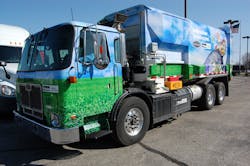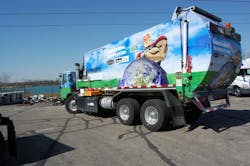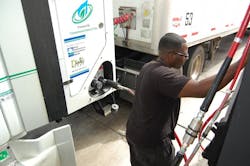Alternative propulsion still seen as attractive to trucking
The recent decision by Miami-Dade County, FL, to purchase 29 additional hybrid trucks for its refuse fleet – bringing the total number of such units it operates up to 64 – is an indication at least to some experts that alternative propulsion options will remain attractive to truck-based firms despite the current low price of diesel fuel.
“The recent decline in diesel prices is something of an anomaly,” Tom DeCoster, business development manager for the hybrid drive systems division at Parker Hannifin, told Fleet Owner.
“There’s really no guarantee on the price of any fuel, be it diesel or natural gas, and whether you talk to municipal or private fleets today, everyone is looking for ways to lower their total cost of operation (TCO) for the long term,” he said.
DeCoster added that this is actually the third order Miami-Dade has place for Autocar E3 hybrid refuse trucks equipped with Parker’s RunWise system that’s designed to “capture” more than 71% of braking energy to then help “launch” vehicles with less engine power – saving up to 4,300 gallons of fuel per year per truck.“It’s really a silver bullet when it comes to saving fuel,” he noted, pointing out that such hybrid technology delivers the highest return for trucks involved in high payload stop-and-go operation, such as waste collection.
Another benefit of this hybrid system is savings on brake maintenance, pushing out brake “re-lining” out to three or three and a half years based on data gleaned from the 115 to 200 RunWise equipped trucks currently in operation among 30 municipal fleets across the U.S., DeCoaster said.
“Traffic isn’t light anywhere anymore and in the case of municipalities no one wants to raise taxes,” he pointed out. “So you now have to contend with more vehicle wear-and-tear in cities where voters don’t want more taxes. That means a fleet has got to generate more savings from operations.”
In a recent research note, Michael Baudendistel, VP at Wall Street investment firm Stifel Nicolaus & Co. touched on similar issues where natural gas is concerned within the trucking space.
He noted that natural gas vehicles are expected to represent about 2% of the North American heavy duty trucks produced in 2014, with some industry suppliers such as natural gas engine maker Westport Innovations expecting that figure to increase to between 7% and 10% by 2020.While sales of natural gas-fired trucks for heavy duty applications are expected to be up 20%-25% over 2013 volume, that figure that is “considered disappointing” by many industry observers, said Baudendistel, with declining petroleum-based fuel prices and the enhanced fuel efficiency associated with new diesel equipment when compared with older equipment responsible for that slump.
Yet he said with compressed natural gas (CNG) in particular usually costing as much as $2 less per diesel-gallon-equivalent than diesel with much less variability in fuel costs given the much smaller portion of the gas-based fuel price dictated by the underlying commodity cost, natural gas holds several key long term advantages as a fuel source.
“Natural gas burns cleaner than diesel, which eliminates the need for expensive and maintenance-intensive emissions after-treatment components,” Baudendistel pointed out. “Shale drilling activities [for natural gas] may set up the next catalyst to further improve freight transportation cost efficiency through utilization of a more abundant and less expensive fuel source.”
And it is for such reasons that other industry observers say it’s too early to discount the role alternative propulsion sources can play in trucking’s future.
“It’s not helpful to fleets to make long-term decisions based on short-term fuel price changes,” David Hillman, GM for the vocational product line at Navistar, told Fleet Owner.
“For example, we clearly see natural gas playing a big role is specific trucking niches – niches that can be extremely sizable, such as refuse,” he stressed.
“The ability of many waste companies to ‘brew their own fuel’ as a byproduct from landfill methane and then mix it in with natural gas to fuel their trucks creates a very compelling fuel cost savings story for the long term,” Hillman added. “That’s why you are seeing such strong penetration of natural gas in markets such as refuse and may see it expand to others such as municipalities in the future.”
About the Author
Sean Kilcarr
Editor in Chief
Sean Kilcarr is a former longtime FleetOwner senior editor who wrote for the publication from 2000 to 2018. He served as editor-in-chief from 2017 to 2018.


